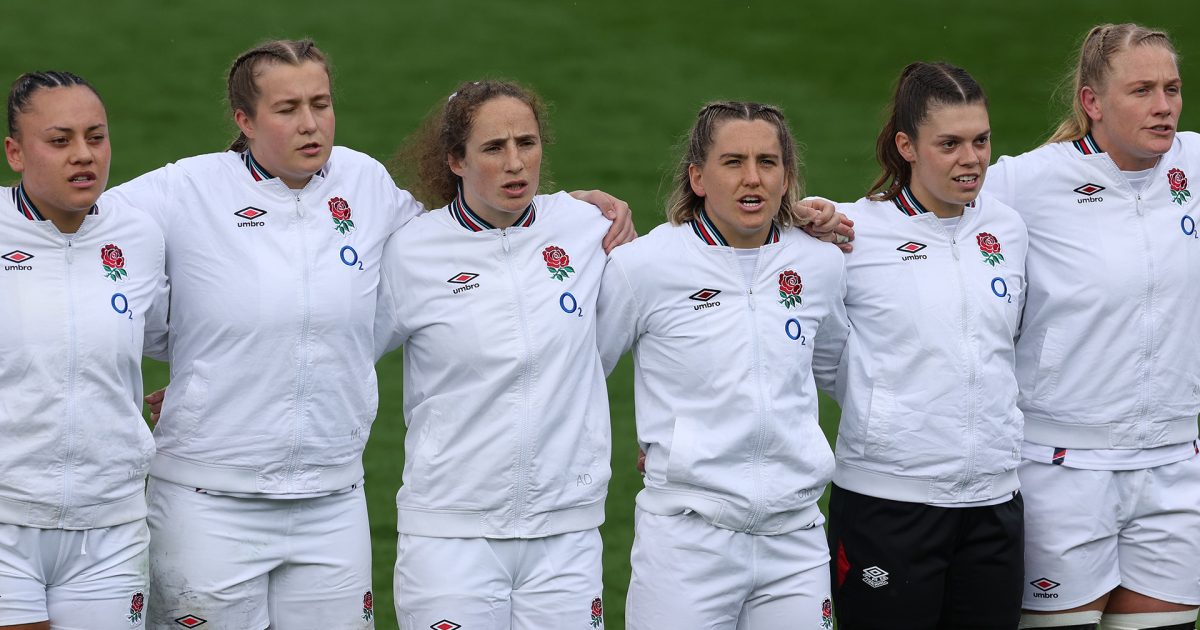John Mitchell's selection 'headaches' as Rugby World Cup draws closer

With John Mitchell operating on a two-week selection policy whereby England players are notified of their selection two matches at a time for the first four rounds of the Women’s Six Nations, last weekend’s 59-7 victory over Scotland saw multiple players stake their claim for a starting shirt in the Grand Slam decider this weekend.
Claudia MacDonald was one such player who shone at Mattioli Woods Welford Road, bagging a brace to take her tally up to three tries so far this Women’s Six Nations.
MacDonald, who, as well as being a skilled winger, also has prior experience as an adept scrum-half, returned to the England starting team following 10 months of rehabilitation for a serious neck injury to score on her first Test back against Italy.
“She’s an international rugby player that’s of the highest quality,” Mitchell told the media about MacDonald following her two-try performance against Scotland.
“She’s created competition, she has a different skillset to the other wingers as well, which will become very useful for us in the year.”
While England are blessed with an abundance of talent to choose from across the board, this presents somewhat of a selection ‘headache’ for the head coach.
“Most players are giving me a headache. There’s plenty of competition in the side. There’s Jess [Breach], there’s Claudia, there’s Abby [Dow], there’s Mia [Venner] who hasn’t played since Italy, so yeah, it’s a good headache to have,” Mitchell said, making reference to their depth on the wing in particular.
With competition strong for all positions, another player who stood out during round four was Holly Aitchison, who played fly-half. The number 10 jersey has been worn by Helena Rowland (versus Itay), Zoe Harrison (versus Wales, Ireland), and Aitchison (versus Scotland) so far this campaign.
Bristol Bears player Aitchison was fly-half for two out of three of England’s WXV 1 games last year, and four out of five Women’s Six Nations games in 2024, including the final game against France.
Following Aitchison’s performance against Scotland this year, in which she had a 77% success rate from the tee, Mitchell added: “She’s been training very well, she’s been fulfilling her role very well. A good performance today; very lucky that we’ve got three very, very good 10s. They’re all going to play a part during ’25, and she did her job today.
Providing clarity and certainty to players around selection is a key mantra of Mitchell’s, and will be something that is ever more crucial as pressure mounts ahead of their home Rugby World Cup, now only three months away.
“Certainty [on selections] is really important to me for cohesion. I think I’ve demonstrated certainty, I’m just playing out a plan at the moment, which is going to help us in ’25 because we don’t know who’s going to be certain when it comes to a situation where that matters,” the head coach stressed.
Mitchell, who was head coach of the All Blacks at the 2003 Rugby World Cup and was defence coach for the England and Japan men’s teams at the 2019 and 2023 World Cups, respectively, also hammered home the requirement of care when it comes to the selection process.
“We’re a high-performing team. We look to get better. We’re not number one ranked in the world for nothing; these girls are unbelievable. The way that they fail at training, the way they push each other at training, the way that they support each other – it’s also a high place of care,” he said.
“I might be demonstrating that I’ve been a professional for a long time and making hard decisions is part of my job; there’s still a large bit of high care when it comes to making selections.
“We don’t just select people based on just their talent. Next week [France] is a different tactical game altogether. Tactically, the skillsets that are needed and that performance will be considered. Most people have had two games now, so we’re in a good place. Whoever gets selected will do their job and hopefully, if everyone does their job well and enjoys doing their job, then everyone wins.”
With squads for the 2025 Rugby World Cup being capped at 32 players and Six Nations squads currently made up of 37, some tough selection decisions will likely have to be made as England go in search of a RWC title on home soil after two heartbreaking final losses on the bounce.




































